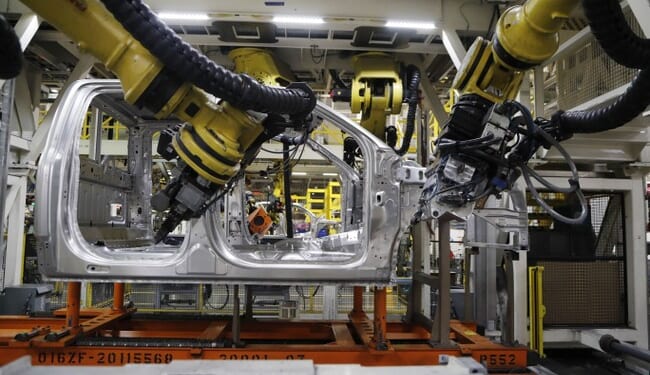Frank Luntz shares a poll result derived from a Cato Institute survey. In it, 80 percent of those asked say (“agree” that) “America would be better off if more Americans works in manufacturing than they do today.” Luntz also adds into the tweet another response from that poll in which 73 percent of those asked “disagree” that they “would be better off” if they “worked in a factory instead of” their “current field of work.”
“America would be better off if more people worked in manufacturing.”
• 80% of Americans agree
• 20% disagree“I would be better off if I worked in a factory.”
• 25% of Americans agree
• 73% disagree
• 2% currently work in a factory👉🏻 https://t.co/ycnHVZ1gT1 pic.twitter.com/4NXb0GLK5L
— Frank Luntz (@FrankLuntz) April 13, 2025
He continues, Frank Luntz does, by drawing some conclusions.
This poll is a Rorschach test for people on both sides of the free trade debate.
It either shows that:
1. Pro-manufacturing people (80%) don’t actually want to work in factory jobs (25%).
2. Or there is potential/willingness (25%) for 10x growth in current factory jobs (2%).
— Frank Luntz (@FrankLuntz) April 13, 2025
Say it is not so. There are people, according to that survey published in August of 2024, who respond to a poll that America would be better off if more Americans works in manufacturing than they do today.
In the nursery tale of the Little Red Hen, the Little Red Hen does all of the work and has no help; and then when the time comes to consume, all of the helpers come around. That is, at least, a rough and perhaps somewhat foggy recollection of the tale of the Little Red Hen.
We as a society like our stuff but may not feel so inclined to do what is necessary to produce or manufacture such things. Manufacturing corporations should be able to hire competent employees and pay them well. Many may flock to manufacturing positions and thus bolster what is produced and manufactured in the United States. On the other hand, we as a society may make the collective decision to sacrifice production so that a lesser number of people have to work in factories. It is about choices and priorities. Balances must be struck. Considerations must be made. And nothing should be the end of the world. Companies are going to compete. Product lines are going to be improved. Sometimes there may be seasons of heavy manufacturing and seasons of not as much at other times. Some manufacturing will sell well because it is cutting-edge, and other manufacturing will sell well because it is tried and tested over time.




![Jasmine Crockett Justifies Mass Illegal Immigration With Bizarre Argument [WATCH]](https://www.right2024.com/wp-content/uploads/2025/03/1742007023_Jasmine-Crockett-Justifies-Mass-Illegal-Immigration-With-Bizarre-Argument-WATCH-350x250.jpg)
![Red Sox Fan Makes the ‘Catch of the Day’ with Unconventional ‘Glove’ [WATCH]](https://www.right2024.com/wp-content/uploads/2025/04/Red-Sox-Fan-Makes-the-‘Catch-of-the-Day-with-350x250.jpg)


![NYC Tourist Helicopter Falls into Hudson River, Siemens Executive and Family Among Those Killed [WATCH]](https://www.right2024.com/wp-content/uploads/2025/04/NYC-Tourist-Helicopter-Falls-into-Hudson-River-Siemens-Executive-and-350x250.jpg)








